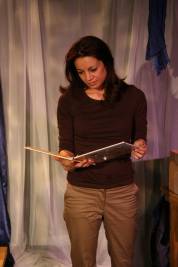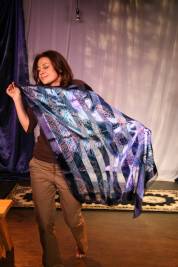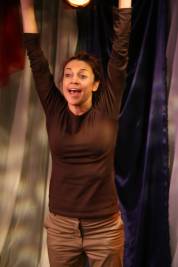
Anna Khaja returns to the stage in Wendy Graf’s powerful solo piece No Word In Guyanese For Me, the recent Ovation-award winner bringing to vivid life a young Guyanese who discovers after her family’s move to New York City that she is a lesbian—and that there is no word in her native language for the person she is.
We first meet Hanna Jokhoe as a young child running “through da tall grasses, and my toes go squish, squish, squishing through da clay, da rich, red Guyanese dirt…,” Khaja convincing us with Hanna’s little girl voice and Creole accent that she is indeed a mere five years of age.
“Dat was before. Before Mumma die in da fire,” Hanna continues, recounting the first of several dramatic childhood experiences that shape the wounded but resilient adult Hanna is to become. Taken in by her aunt and uncle “Mamee” and “Mamoo,” Hanna learns the precepts of Islam from the Quran, which Hanna the child describes to us as “book of vedy important tings Allah say, den tell to da angel Gabriel, who tell dese tings to Mohammed. Den Mohammed teach da peoples da Islam.”
“Auntie Mamee” instructs little Hanna in how to wear the hijab, a scarf which covers her hair “like princess hat,” and the abaya, which hides all but her face, feet, and hands, garb which makes the young Guyanese stand out like a sore thumb when her family moves to “A story of Queens,” New York.
Thirteen-year-old Hanna is just beginning to discover a talent for photography and to dream of college and a career when she learns to her dismay that she has been promised in marriage to her cousin Sammy. Two years later come the World Trade Center attacks, an event which traumatizes Hanna and the entire Muslim community living in New York.
Hanna does indeed marry Sammy at age seventeen, but cannot bring herself to “grant” him his “sexual reward.” “I am not…attracted to my husband,” she tells Auntie Mamee. “Attraction will come,” her aunt replies. “Endure,” she says.
When Sammy discovers an album full of photos Hanna has taken of her high school art teacher Miss Martin, he realizes, perhaps even before his wife does, that she is “into girls.” This realization marks the end of Hanna’s marriage, but not before Sammy rapes her with savage force, and if the young bride is hoping for compassion from her aunt and uncle, she is soon disabused of that notion.
Securing work at a video store across the street from Queens College, Hanna spends her lunch hours wandering around the campus pretending to be a student. It is here that the young woman happens upon “the table of the homosexuals” and “it is as if the lens of the camera brings the world into hard focus. As if you have been holding your breath for such a very long time and finally, finally you can let it out.”
Hanna’s road to self-discovery and love, though not necessarily to family acceptance, makes up the rest of No Word For Guyanese For Me, and as the above synopsis suggests, it is powerful stuff indeed.
Those who saw either playwright Graf’s one-act Bethany/Bakol or the full-length Behind The Gates (which opens with Bethany’s gut-wrenching thirty-minute monolog) know the playwright’s gift for writing compelling solo performance pieces. Those who saw Khaja’s award-winning self-penned Shaheed: The Dream And Death Of Benazir Bhutto know the actress’s brilliance at bringing to life a full cast of characters while holding an audience in the palm of her hand for seventy-five minutes or so. Together with director Anita Khanzadian, doing superb work as well, Graf and Khaja now explore issues of sexuality, family, and religion in a way that both compels and informs.
The stellar trio are aided considerably in their endeavor by three talented designers. Davis Campbell’s striking set design features sheer, billowing drapes which evoke the scarves and robes worn by Guyanese Muslim women. Matt Richter’s artful lighting, sound, and projection design complement Graf’s text and Khaja’s performance to perfection. Meagan Evers’ costumes suggest Hanna’s traditional and modern garb without requiring the actress to make time-consuming full costume changes. Carla Barnett is producer. jj Jackman is stage manager.
No Word In Guyanese For Me provides neither Hanna nor the audience with easy answers. It does, however, offer a stunning glimpse into a woman’s heart and soul while once again providing proof positive that a single performer can command a stage as completely as a full cast—that is, if the performer in question is Anna Khaja.
Sidewalk Studio Theatre, 4150 Riverside Dr., Burbank.
www.brownpapertickets.com/event/155636
–Steven Stanley
May 29, 2011





 Since 2007, Steven Stanley's StageSceneLA.com has spotlighted the best in Southern California theater via reviews, interviews, and its annual StageSceneLA Scenies.
Since 2007, Steven Stanley's StageSceneLA.com has spotlighted the best in Southern California theater via reviews, interviews, and its annual StageSceneLA Scenies.







 COPYRIGHT 2024 STEVEN STANLEY :: DESIGN BY
COPYRIGHT 2024 STEVEN STANLEY :: DESIGN BY